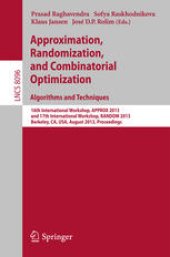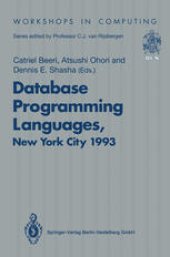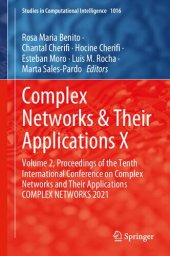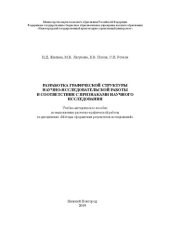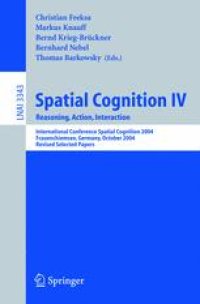
Ebook: Spatial Cognition IV. Reasoning, Action, Interaction: International Conference Spatial Cognition 2004, Frauenchiemsee, Germany, October 11-13, 2004, Revised Selected Papers
- Tags: Artificial Intelligence (incl. Robotics), Data Structures, Computer Graphics, Simulation and Modeling, Computer Applications in Earth Sciences
- Series: Lecture Notes in Computer Science 3343
- Year: 2005
- Publisher: Springer-Verlag Berlin Heidelberg
- Edition: 1
- Language: English
- pdf
This is the fourth volume in a series of books dedicated to basic research in spatial cognition. Spatial cognition is a field that investigates the connection between the physical spatial world and the mental world. Philosophers and researchers have p- posed various views concerning the relation between the physical and the mental worlds: Plato considered pure concepts of thought as separate from their physical manifestations while Aristotle considered the physical and the mental realms as two aspects of the same substance. Descartes, a dualist, discussed the interaction between body and soul through an interface organ and thus introduced a functional view that presented a challenge for the natural sciences and the humanities. In modern psych- ogy, the relation between the physical and the cognitive space has been investigated using thorough experiments, and in artificial intelligence we have seen views as diverse as ‘problems can be solved on a representation of the world’ and ‘a representation of the world is not necessary. ’ Today’s spatial cognition work establishes a correspondence between the mental and the physical worlds by studying and exploiting their interaction; it investigates how mental space and spatial “reality” join together in understanding the world and in interacting with it. The physical and representational aspects are equally important in this work. Almost all topics of cognitive science manifest themselves in spatial cognition.
This book constitutes the thoroughly refereed postproceedings of the International Conference on Spatial Cognition 2004 held in Fauenchiemsee, Germany in October 2004.
The 27 revised full papers presented were carefully reviewed and selected from 50 submissions. The papers are organized in topical sections on route directions, wayfinding, and spatial behaviour; description of space, prepositions and reference; meta-models, diagrams, and maps; spatial-temporal representation and reasoning; and robot mapping and piloting.
This book constitutes the thoroughly refereed postproceedings of the International Conference on Spatial Cognition 2004 held in Fauenchiemsee, Germany in October 2004.
The 27 revised full papers presented were carefully reviewed and selected from 50 submissions. The papers are organized in topical sections on route directions, wayfinding, and spatial behaviour; description of space, prepositions and reference; meta-models, diagrams, and maps; spatial-temporal representation and reasoning; and robot mapping and piloting.
Content:
Front Matter....Pages -
Finding the Way Inside: Linking Architectural Design Analysis and Cognitive Processes....Pages 1-23
Modelling Wayfinding in Public Transport: Network Space and Scene Space....Pages 24-41
Isovists as a Means to Predict Spatial Experience and Behavior....Pages 42-57
A Model for Context-Specific Route Directions....Pages 58-78
Investigation of Preference Between the Least-Angle Strategy and the Initial Segment Strategy for Route Selection in Unknown Environments....Pages 79-97
Spatial Prepositions and Vague Quantifiers: Implementing the Functional Geometric Framework....Pages 98-110
Reference Frame Conflict in Assigning Direction to Space....Pages 111-123
Identifying Objects on the Basis of Spatial Contrast: An Empirical Study....Pages 124-146
Cultural Differences of Spatial Descriptions in Tourist Guidebooks....Pages 147-164
Reasoning About Consistency with Spatial Mental Models: Hidden and Obvious Indeterminacy in Spatial Descriptions....Pages 165-180
Spatial Principles in Control of Focus in Reasoning with Mental Representations, Images, and Diagrams....Pages 181-203
Perceptually Induced Distortions in Cognitive Maps....Pages 204-213
Characterizing Diagrams Produced by Individuals and Dyads....Pages 214-226
Sketch Map Analysis Using GIS Buffer Operation....Pages 227-244
Imagined Perspective–Changing Within and Across Novel Environments....Pages 245-258
Thinking Through Diagrams: Discovery in Game Playing ....Pages 259-282
Exploiting Qualitative Spatial Neighborhoods in the Situation Calculus....Pages 283-303
Branching Allen....Pages 304-322
SNAPVis and SPANVis: Ontologies for Recognizing Variable Vista Spatial Environments....Pages 323-343
Modelling Models of Robot Navigation Using Formal Spatial Ontology....Pages 344-365
Specification of an Ontology for Route Graphs....Pages 366-389
Autonomous Construction of Hierarchical Voronoi-Based Route Graph Representations....Pages 390-412
Using 2D and 3D Landmarks to Solve the Correspondence Problem in Cognitive Robot Mapping....Pages 413-433
Treemap: An O(log n) Algorithm for Simultaneous Localization and Mapping....Pages 434-454
Towards Dialogue Based Shared Control of Navigating Robots....Pages 455-477
Perception and Tracking of Dynamic Objects for Optimization of Avoidance Strategies in Autonomous Piloting of Vehicles....Pages 478-499
Back Matter....Pages 500-517
....Pages -
![Анализ и управление стационарными и нестационарными режимами транспорта газа: Analysis and control of stationary and non-stationary regimes of gas transport : [монография]](/covers/files_170/3178000/a845d844c127f43b25aefa89e712b137-g.jpg)


